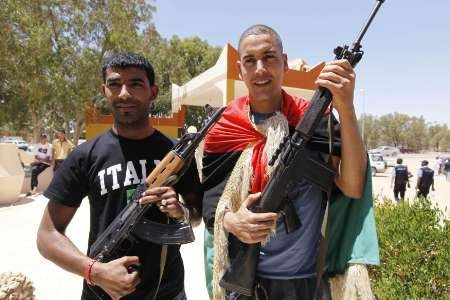Libyan Conflict: France needs to stop acting like a colonial power

After allegations first emerged in the French newspaper Le Figaro, France has today confirmed it dropped arms to Berber tribal fighters in the mountains south-west of the capital, Tripoli.
"We began by dropping humanitarian aid: food, water and medical supplies," said Col Thierry Burkhard, spokesman for the French general staff.
"During the operation, the situation for the civilians on the ground worsened. We dropped arms and means of self-defence, mainly ammunition," he told AFP news agency.
He said the arms were "light infantry weapons of the rifle type", dropped over a period of several days "so that civilians would not be massacred".
The decision to drop arms to the Libyan rebels was reportedly taken following a meeting in mid-April between French President Nicolas Sarkozy and the Chief of Staff of the Libyan rebels, Gen Abdelfatah Younis.
France is said to have been concerned at the stalemate in a conflict between the rebels and pro-Gaddafi forces that started in February. As the Nato-led operation became increasingly criticised it seems that the Sarkozy government became even more avid for the rebels to gain advantage. While French officials say the arms were only light infantry weapons, French press reports say 40 tonnes of weapons were sent to western Libya, including "a few light tanks" that were smuggled in across the Tunisian border.
Le Figaro also reported that it had seen a confidential defence map showing two makeshift airstrips in rebel-held towns, built to receive small aircraft from the Gulf that can move arms closer to the front.
Despite its explanation it is unlikely France will be able to satisfy its detractors. The decision to arms the rebels is very controversial, especially as the continent has been inundated with arms that often ended up in the hands of radical militant groups.
The Africa Union criticised France as it insisted its actions could lead to problems that could resemble those of war-torn Somalia.
Mr Jean Ping, the African union commission chief told the BBC "There are several problems."
"The risk of civil war, risk of partition of the country, the risk of 'Somalia-sation' of the country, risk of having arms everywhere... with terrorism.
"These risks will concern the neighbouring countries."
Russia has also strongly criticised France for dropping weapons to Libyan rebels and demanded an explanation from Paris.
"If this is confirmed, it is a very crude violation of UN Security Council resolution 1970," Foreign Minister Sergei Lavrov said.
China on Thursday urged nations to obey U.N. rules about arms transfers to Libya, but stopped short of openly criticising France after it became the first NATO country to admit arming rebels fighting Libyan leader Muammar Gaddafi.
The legality of France's move could be challenged because of a United Nations-mandated arms embargo on Libya. U.N. diplomats have said arms transfers without the prior consent of a U.N. Security Council committee could violate the embargo.
"China urges the international community to strictly abide by the spirit of the relevant U.N. Security Council resolution and not take any actions that exceed the authority granted by that resolution," Chinese Foreign Ministry spokesman Hong Lei said when asked about France's action.
"We have always urged a political solution to the current crisis in Libya, so that Libya returns to peace and stability as soon as possible," Hong said at a regular news conference.
The problem with France sending weapons to the rebels is that once the conflict is over who knows where these arms will end up?
French officials seem very detached from the reality and the problems the African continent faces. By pointing out that the French forces only provided the Libyan fighters with light weaponry, officials tried to play down the consequences of the French move.
The one and important fact they seem to forget however is that the continent is littered with hundreds of millions of small arms and light weapons that fuel conflicts and instabilities, making it difficult for any economic development to take place.
The light arms - lightweight, highly portable, and devastatingly effective in the hands of even young or poorly trained users - were first shipped to Africa during the Cold War to equip anti-colonial fighters, newly independent states and superpower proxy forces alike. The collapse of the Soviet bloc saw a new flood of small arms entering Africa as manufacturers put additional millions of surplus Cold War-era weapons on the international arms market at cut-rate prices.
For decades, we have witnessed the tragic and the devastating effects of wars in Somalia, Sudan, Chad, Central African Republic, DR Congo, Angola, Ivory Coast fuelled by arms imports from US, UK, France, Russia, North Korea, China, former Soviet and Eastern European nations. Those arms are then often used for internal repression as seen in Zimbabwe, Guinea, Sudan and Equatorial Guinea where ordinary citizens and opposition party members are arrested, tortured and killed.
"The proliferation of light weapons in Africa poses a major threat to development," noted Ms. Virginia Gamba, the former director of the Arms Management Programme of the South African Institute for Security Studies (ISS). Their low cost, ease of use and availability "may escalate conflicts, undermine peace agreements, intensify [the] violence and impact of crime, impede economic and social development and hinder the development of social stability, democracy and good governance."
It is the shame that despite the long shared history it has with the African continent France is still acting like a colonial power, arming the fighters that are on its side without thinking about the potentially catastrophic consequences that its actions can have on the civilians.
© Copyright IBTimes 2025. All rights reserved.





















